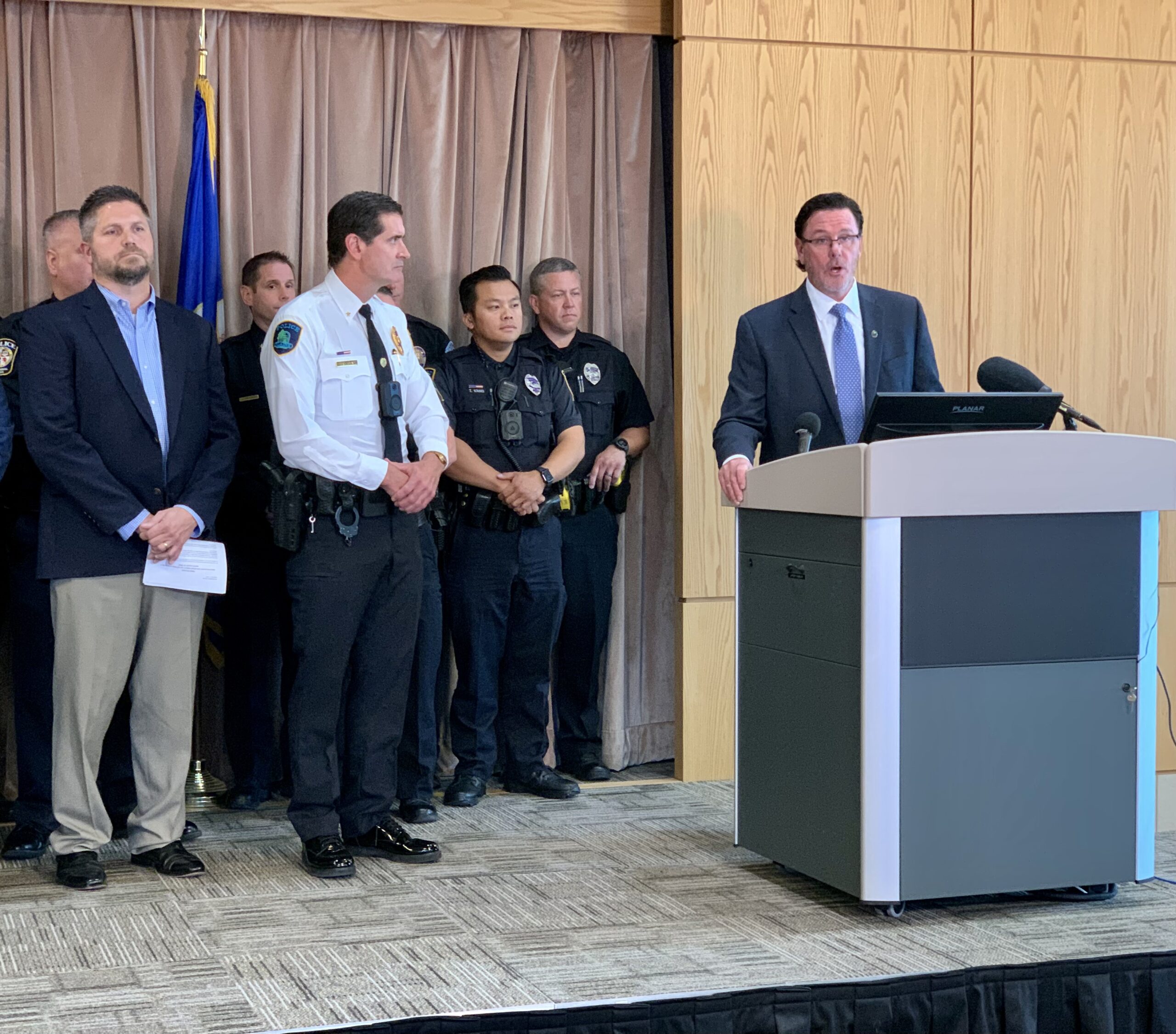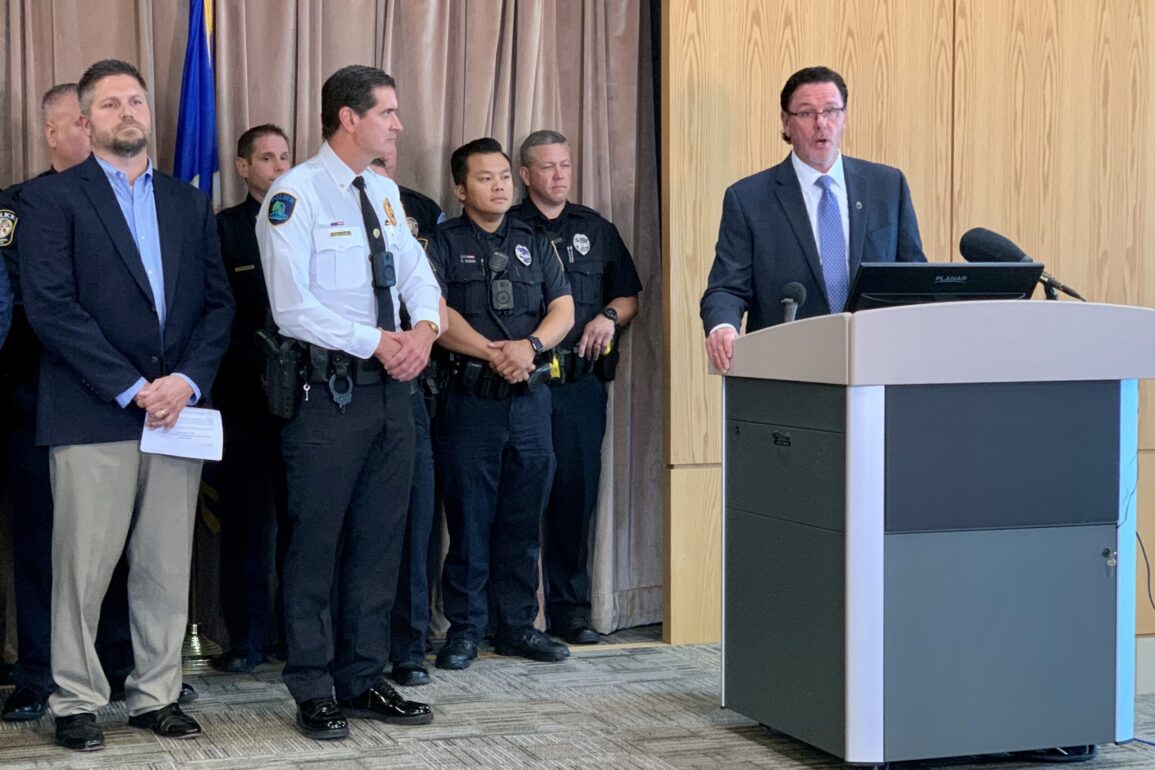
Most of the state Senate Republican caucus supported a 2021 law that banned corrections officers from putting prisoners in a prone — or face-down — position. Now, however, legislative Republicans want to roll back a law passed this year that seeks to provide the same protection to Minnesota students.
During a special session in 2021, the Minnesota Legislature passed a wide-ranging public safety bill that included a provision banning correctional officers from using chokeholds and prone restraints on inmates, unless the hold could protect an officer or another person from “great bodily harm or death.”
Lawmakers earlier this year codified similar protections to Minnesota’s K-12 students. But this time around, officers, police groups and Republicans say banning the use of prone restraints on students creates a safety risk and uncertainty around how far they can go to keep the peace in schools. They’ve engaged in a nearly month-long campaign urging a special legislative session and a change to the law.
House Minority Leader Lisa Demuth, R-Cold Spring, Sen. Zach Duckworth, R-Lakeville, and Sen. Warren Limmer, R-Maple Grove, are among the most vocal Republicans calling to change the restraint ban in schools. All three voted during the 2021 special session to pass the public safety package, including the ban on chokeholds and prone restraints in prisons.
Duckworth late last month said eliminating the restraint ban on students was imperative for safety.
“Moms and dads count on us to safeguard their children. The confusion surrounding this law is causing a growing number of school resource officers to be pulled out of schools across our state, leaving students and staff vulnerable in cases of emergency,” Duckworth said.
Duckworth told the Reformer that the law regulating schools is unclear and was implemented without input from law enforcement, unlike the restraint ban in prisons.
“This is a clarity issue. It’s an ambiguity of language issue, not an issue of how we’re allowing certain police officers or correctional officers to use things out in the field per se,” Duckworth said, noting the two laws aren’t exactly identical.
Officers who work in schools, often called school resource officers, say they rarely use force on students. Their primary job, officers argue, is to build relationships with students, which helps them de-escalate tense situations and fosters a safe learning environment.
About 40 law enforcement agencies have pulled their officers from local schools because of the law change, according to the Minnesota Police and Peace Officers Association, a group of law enforcement officers at the forefront of the attacks on the new law.
In 2021, the police groups made no concerted effort to lobby against the prison law or call for its revocation when Gov. Tim Walz signed it.
“The Hardel Sherrell Act was broadly supported and bipartisan,” said House Majority Leader Jamie Long, DFL-Minneapolis, who in 2021 was the chief author a law that was folded into the public safety package that included the restraint ban. The law was named after an inmate who died in the Beltrami County Jail in 2019 because of medical neglect. “This was not a concern that was raised with this being the standard for our correctional facilities. I don’t think it should be a concern in our schools either.”
James Stuart, executive director of the Minnesota Sheriffs’ Association, said it’s “borderline irresponsible” to compare inmates with students, noting that the restraint bans are occurring in vastly different settings.
Stuart said prisons have numerous staff on hand, so a correctional officer can call for backup and receive it shortly. This isn’t the case in the majority of schools, he said.
“To compare a school environment to a prison environment would just speak to the naïveté of what the law enforcement officers are dealing with,” Stuart said.
Minnesota is currently experiencing staffing shortages at many of its larger correctional facilities across the state. Inmates at the Stillwater Correctional Facility earlier this month staged a protest and refused to return to their cells for several hours in part due to staffing shortages.
The law says correctional officers may not use chokeholds, prone restraints, tie a person’s limbs together behind their back or restrain a person face down in a vehicle.
The statutes articulating the restraint ban in prison and the prone restraint ban in schools are largely the same. The prison ban states correctional officers may use the prone restraint holds to protect against “great bodily harm,” while the school ban says a district employee may use them to prevent “imminent bodily harm.”
According to Department of Corrections guidance, prone restraint doesn’t include mechanical restraints, like placing a person face down and putting on handcuffs, and getting that person into a sitting position. The school law and the two opinions from Minnesota Attorney General Keith Ellison interpreting it make no mention of mechanical restraints.
The Department of Corrections did not make anyone available for an interview.
“We know that chokeholds and prone restraints are not safe, and it’s the same rationale for why we enacted those for our correctional facilities is why we enacted those for schools,” Long said. “We want to make sure that these restraints are not used and that we can de-escalate and use other types of restraints when necessary.”
Police in Minnesota have been banned from using chokeholds since the 2020 police murder of George Floyd, who died of asphyxia while held in a prone position by police. Since 2015, school districts have been banned from using prone restraints on students with disabilities.
The MPPOA endorsed nearly 130 Republican candidates for the Legislature during last year’s midterm election and seven Democrats, while also backing Walz’s GOP opponent Scott Jensen. The group last year gave more than $155,000 to the Senate GOP campaign arm, and another $10,000 to House Republicans, as well as thousands more to individual Republican candidates.
This post was originally published on this site be sure to check out more of their content.









